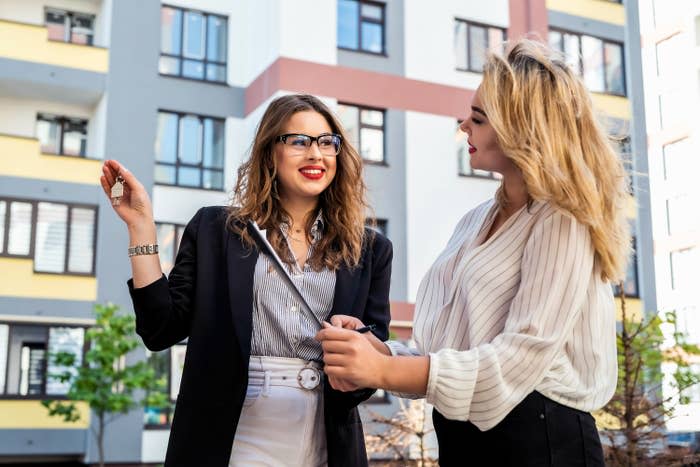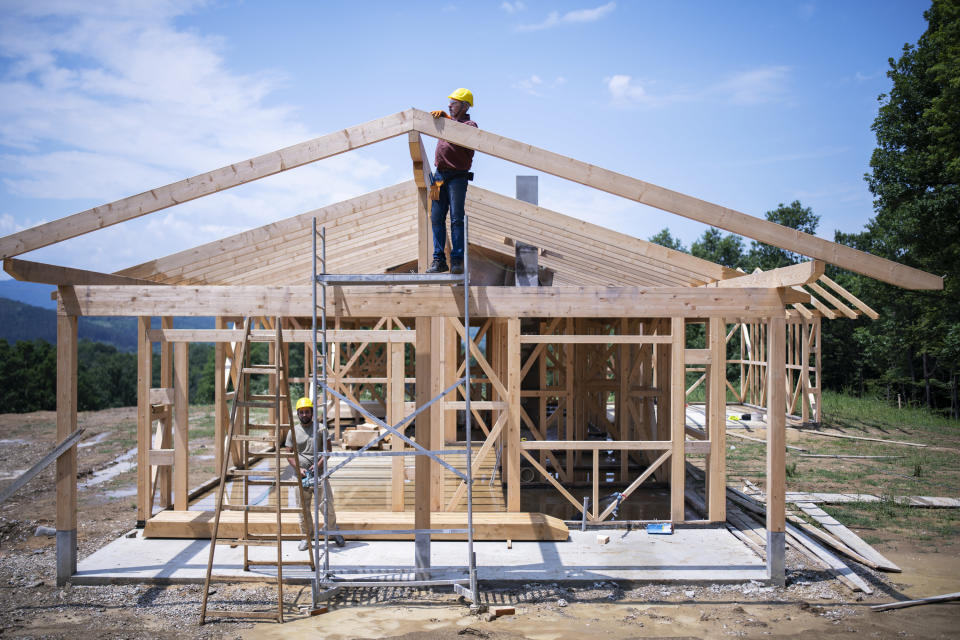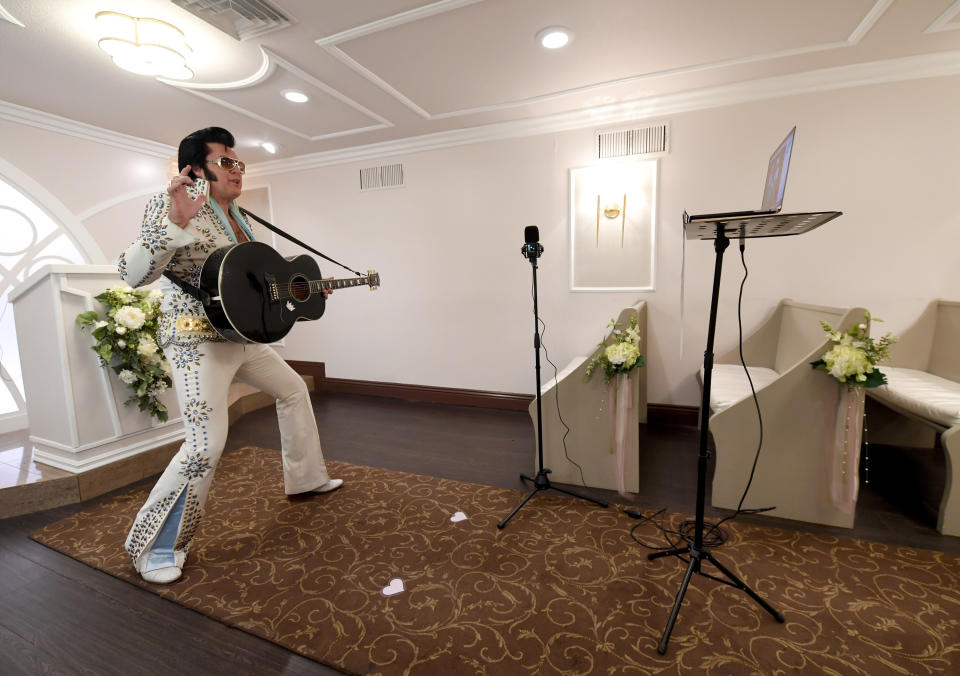Millennials Are Sharing How They Bought Their Homes, And Surprise, It Wasn't By Skipping Avocado Toast
For years, millennials have lagged behind older generations when it comes to home ownership. But that doesn't mean none of us are buying homes. In fact, according to US Census data, 43% of millennials were homeowners in 2020.
HBO / Via giphy.com
As someone who has yet to enter the housing market, I was really curious to hear how other millennials managed to buy their homes. So I asked members of the BuzzFeed Community to share how they did it, and I was blown away by hundreds of responses and incredibly varied stories. Here are some of the most interesting replies:
1.This person got free rent by working as an apartment complex manager, which helped them save up a down payment.

"I attended a work-study college where I didn’t pay tuition. My husband had scholarships and his parents to help pay for his education, so neither of us had any student loans when we got married. We rented for a while until my husband landed a more permanent job, but he ended up going back to school (full scholarship). Once he graduated, I took a side job managing an apartment complex on top of my full time job, so we got to live rent and utility free. We saved everything I made, bonuses, tax refunds, or any extra money for a year, then bought our house in a nice suburb soon after finding out I was pregnant. We bought about eight months before the pandemic hit, and I’m thankful we did. Home prices shot way up in our area, and I’m not sure if we would be able to afford it if we were shopping now."
2.This person took advantage of two different first-time buyer mortgage programs that make home ownership more affordable.
"I'm not going to lie to you all, for my husband and me, it was a mixture of serious sacrifices, stars aligning, and decision-making skills. When applying for the loan, we applied under his name 'cause my credit at the time was crap. And we utilized both the USDA loan and first-time home buyer assistance. Between the loan and first-time home buying assistance, we didn't need any down payment at all.
I know that we lucked out with a few things, but my suggestions to all are: 1.) Save. You'll always need money whether it's for a down payment or furniture or fixing something. Start saving ASAP. 2.) I'm sorry, but you might not get your dream house. You might have to make some sacrifices to be a millennial homeowner. My home isn't pretty or fancy. But it's MINE (and my husband's). 3.) Take advantage of as many loans and home buyer assistance programs that you can possibly qualify for. Talk to your realtor and really do your homework!"
3.This person made money for their down payment by working as a surrogate.
"I bought my place in San Diego in 2014. I paid about $210k for it. I had already had one child by then, so I did a few surrogate pregnancies. I made enough to pay off all of my debt and my home. If you have good pregnancies, I HIGHLY recommend it. It's really a win-win for everyone. And helping someone achieve their dreams of having a baby is so rewarding in itself."
4.And this couple went full #vanlife, traveling for work and saving up for a fixer-upper.

"My husband and I quit our jobs, bought and built out a camper van, and have been living a full-time van life off and on for the last two years!!
I’m an ultrasound tech and started taking travel assignments across the country. My husband travels with me, since he works remotely as a marketing admin. We’ve been able to pay off our student loans, eliminate our debt, and save up enough for a down payment. We bought a fixer-upper cabin in the mountains of western North Carolina a year ago. If we had stayed at our previous permanent jobs, we’d probably still be renting an apartment in the city, no closer to being able to afford a home of our own."
5.This person bought their rental home when their landlord wanted to sell.
"We rented a home for a year, and then the owners informed us they intended to sell. We gave them a fair offer before they listed it, wrote a heartfelt letter explaining how much we loved living in the house, and they accepted. We had to borrow $30K from my mom and were fortunate enough to be gifted an additional $10K from my grandparents. My husband and I make $180K combined annually, but the purchase would not have been possible without the help from my family. We are eternally grateful."
6.This person got a down payment together by asking for cash instead of wedding gifts.
"For our wedding we asked for cash gifts instead of setting up any type of gift registry. Some people didn't really like that and probably thought it was tacky, but we were able to put a down payment on our house with that. Also I live in North Dakota, so the houses here are pretty cheap compared to other places in the US, and we commute 40 minutes to work every day. If our house was in the city where we work, we would have paid double or triple the price for it. So we looked at houses in smaller towns around the area. The amount of money we saved is wild, and our mortgage is half of what our apartment rent was."
7.And this person had to waive contingencies to buy during the pandemic housing boom.

"After getting married in the pandemic, my husband and I were lucky enough to have jobs that kept going despite COVID. We searched and put in offers for about 15 houses before we landed on one (everyone was outbidding us). We took some desperate measures that previous generations might look down on (i.e. forgoing all contingencies and accepting a house with an old HVAC system), but that's how the market is moving these days. This whole process took us about four to five months. We had enough in our savings and some money from wedding gifts to put down 3% and got our house when the interest rate was really low. It's a townhouse in Northern Virginia."
—Anonymous
8.This person had a job that paid for their education, and stayed with their parents for a year after college to save up.
"When I went to nursing school, I went to a community college that my job paid for, so I got really lucky with that. I worked there on weekends for shift differential and bonuses that we got for off shifts, and I would do doubles Friday and Saturday. I stayed at home with my parents for a year after I graduated, while saving every paycheck. I kept a little out for personal use, and the rest all went towards my down payment. I still drive the same car I had when in nursing school, and I want to keep driving it until I pay off my loan from getting my bachelor's. My vacations are staycations or closer drives, and I’m happy as long as I’m not at work! I live in NE Pennsylvania, and the market wasn’t too bad at the time (10 years ago)."
9.This person moved to Europe to buy a home.
"I literally moved to a country in Europe where it's still affordable to buy a house on a professional teacher's salary. If I was still living in the US, I would still be paying three times my current monthly payment for a crappy apartment."
10.This person was able to save money during the pandemic to buy a condo.

"We saved a lot of money when the pandemic first started. Being on lockdown prevented us from spending so often, the stimulus helped, and rates were low. We could only afford a condo in an area we didn’t really want to live in. It was super competitive, so the process was long. But I’m so grateful that we got in when we did, because I really don’t know if we could have afforded it at any other time."
11.This veteran got a VA loan and a little help from family to buy a house.
"I bought my house a few years ago using my VA home loan. I was only able to do it because I didn't have to put a down payment. Otherwise, I would probably still be living in a rental house. I also bought the house from one of my dad's neighbors, and she paid the closing costs. I had to pay some fees out of pocket. My dad helped me, but I paid him back. Since I'm in Texas and am a disabled veteran (Army), I get an exemption that lowers my property taxes. I also use my disability payment to pay my mortgage. If I didn't have any of these things, I probably wouldn't be a home owner."
12.And this person made a pretty great deal with their parents.
"Parental help and luck. My parents received a settlement in 2010. They wanted to invest the money, but neither the stock market nor a savings account looked like a good option. At the same time, I was starting grad school and looking for a place to live. My parents bought a fixer-upper in a down market, and I rented it from them while fixing the house. I benefited from below-market rent, and they benefited because my rent was a better return on investment than they would have gotten from a savings account, and they didn’t have to fully fix the house before collecting.
Then, when I finished grad school, I bought the house from them for market price minus the value of the work I’d done over the years. I would never have been able to get on the property ladder without the combination of their willingness to help, and luck that they got a settlement right when the market was down."
—Anonymous
13.This person bought a new home build with a low deposit and no competition.

"We lived with my parents, who only asked that we cover the water bill. We also purchased a new home build, which only required a $2,000 deposit to hold the lot. The home wasn’t move-in ready for six months, which gave us time to save, and we didn’t have to compete with other buyers."
14.This person is getting some help from a nonprofit organization.
"Well, we're not quite there yet, but are actively looking (which is quite an undertaking in this market!). We are using a program called NACA (Neighborhood Assistance Corporation of America) which is a nonprofit that not enough people know about! Its goal is to combat housing discrimination and predatory lending.
I'm not going to lie, going through the program is...a lot. They obviously have to do extensive checks to minimize the risk of lending, but they also offer you counseling through the process. With their 'character-based' lending, they are very forgiving of low credit scores and other financial issues. There's no down payment, no PMI, a below market interest rate, the ability to buy down the interest rate even lower, and they require the seller to pay closing costs.
In order to 'be ready', we've had a combination of working hard to live within our means, a generous support system, and good luck. We live in Pennsylvania and have a combined household income of around $60,000. We have been working on our student and car loan debts for eight years using a debt snowball. We have lived in a small, cheap apartment for six years. We used our stimulus money last year to pay off the remainder of our student loans — which included a $10k debt to my parents. Once we paid them off in full, they returned the $10,000 to us, this time as a gift. We were fortunate not to be saddled with any expensive medical incidents (our kids are on state insurance, thank goodness), and that neither my husband's or my income was affected by the pandemic."
—Anonymous
15.This person bought a fixer-upper that ended up needing more fixes than they bargained for.
"We both saved for about five years, and we spent two years trying to find a home. After being outbid five times by people that already owned properties and were just looking for another house to rent out, we found a 'fixer-upper.' It has a good amount of land, but the structure is a nightmare. We've owned it for five months and haven't been able to move in because we keep finding more and more wrong with it.
In the end, we've had to replace walls of rotting studs, seal all the windows because they were leaking rainwater, seal the cracked stucco, replace all the rotted drywall, get all electrical up to code, and replace the faulty plumbing. We haven't even started on things like replacing the rotted cabinets and buying appliances yet. We should have known it would be a nightmare, considering it was valued at $100k less than the other homes in the neighborhood."
16.This person used their crypto investments to build a down payment.

"My husband had started investing in crypto back in 2017. There were a few bumps along the road, but he'd invested enough into it over time that five years later, he was able to make a down payment on our current house. Also, we moved out of southern California to another state because we knew we'd never be able to afford a house that suited us in the area, which is an unfortunate reality."
—Anonymous
17.And this person literally built a house.
"My husband literally built our house, so we saved a lot in sweat equity. (He’s a contractor). We had help from family, and his parents let us live with them for a year so we could pour everything into the build. It’s all but impossible to do things on your own. I totally recognize that we had an obscene amount of privilege."
18.This person took advantage of programs that help people in their profession become homeowners.
"I found a bank that offers zero down payment and covers closing costs for teachers."
19.This person took out a loan and lived frugally to afford their house.

"I decided to forego any of the 'fun' years. When I was 21, I bought a house by taking out a small loan and saving up nearly every cent I earned while still living at home with my parents. The loan plus the savings got me enough for a down payment. That meant I was at work full-time everyday and took any opportunity for overtime. I saved up recycling for spending cash, no concerts, no bars, no shopping, no takeout, no trips, no hair services except cuts, buying whatever groceries are on sale, driving an older car so I didn’t have payments, no pets or kids until I was older, choosing to live in a less than desirable area to keep costs low. Mostly, it boiled down to sacrifices I was willing to make. I also didn’t attend university. I chose a trade instead.
But I’m in my 30s now; I’ve bought and sold a couple times, so I have a beautiful acreage instead of the tiny house I started with, surviving financially and way ahead of my peers when it comes to home ownership."
20.And this person inherited theirs.
"My mom died. She died of stage four uterine and cervical cancer in May of 2020. She left me enough money to put a down payment on a home. I know for a fact my husband and I wouldn't be in the home we are now if she hadn't done that for me. I would give every cent back and more if it meant I could bring her back. But I can't. The only thing I can do is thank her for this opportunity to own a home that I can build a family in."
21.This person got a gift from their parents that helped them pay off debt and buy a house.
"My parents are immigrants who got public sector (read: low-to-average-paying) jobs in their 30s. They lived in a lower-priced part of the country, saved well, and made smart but modest real estate decisions. They sold their investment property and gifted me the profit as an early inheritance. It gave me enough to pay off debt, build a healthy savings, and put a down payment for a house. I didn’t originally come from any sort of generational wealth, but this gift is a game-changer, and is setting me up to do the same."
—Anonymous
22.And this person was able to afford a condo after moving for a higher-paying job and skipping a big vacation.

"I bought a condo last year just a few months before I turned 34. I didn't think I would ever own anything, but a few years ago, I got an amazing job that I moved across the country for. While it does put me in a very high cost of living area (northern Virginia), the new job pays really well and pays a substantial bonus at year end. I had been planning to do a big expensive vacation in 2021, but COVID ruined that, so instead of saving for the vacation, I saved during 2020 and 2021 to buy a condo. I also really lucked out and found something that hadn't even been listed yet. So basically, I got lucky in a lot of crucial ways."
23.This person avoided student debt and started a career in the skilled trades to buy their home.
"Skipped college. Learned a skilled trade. Started at the bottom. Worked every hour of overtime available. Bought my house 10 years ago at 26."
—Anonymous
24.This person's parents helped them build their credit so they could get approved for a mortgage.
"I had a fairly sizable savings account (always been more of a saver than a spender, and I was living with my mom), and my parents set me up great to have good credit. They put me as an authorized user on a couple of their credit cards, so my 'oldest account' on my credit report was actually older than I am!"
25.And this person borrowed from their 401(k).

"I took a loan from my 401(k). It’s called a primary residence loan. You’re paying yourself back and it’s a very low interest rate. It’s the only way we could come up with a down payment with rent and two kids in daycare at the time."
—Anonymous
26.This couple signed a rent-to-own agreement to pay for their home.
"By renting to own our first property! A family friend had a plot of land with an old trailer on it. My husband and I signed a land contract with a lawyer, moved into the 1970s nightmare, and just made monthly payments like you would rent or a mortgage. After six painful years, we finally have the land and trailer paid off, and we're in the process of selling it for a down payment on our first house. It was a rough road, but our investment is finally paying off."
—Anonymous
27.This person used a settlement from a car accident toward their down payment.
"I bought a house one year ago with my boyfriend at the time. I was 30, and my boyfriend was 31. We both had been renting and working low wage jobs without assistance from our families since the age of 18. We got together when we were 27 and 28 and moved in together the same year. We both got a little bit nicer jobs (making around $85k combined income) and were able to save some money for one year.
I was also in a moderately bad car accident caused by a distracted driver. I was injured, and my car was totaled. It was terrible, and I still have pain to this day. The point is I received a small, but significant lump sum of money, $6k. We immediately combined this with our house savings, met with a lender, and qualified for a home with our $13k.
Two months later, we bought a house for $320k. We had to do an FHA loan, which sucks, but is better than nothing. Over this past year, we put our stimulus money and our continued savings into updating the house little by little, and we really have a nice little home now. We got married in the backyard last summer!
To sum it up, we wouldn’t have been able to do this without the car accident money and jobs that pay fair wages. Quitting brunch, not traveling, and missing out on adventures with friends was a small factor that definitely helped, but by no means would I own this house if all I did was quit eating avocado toast."
28.This person decided to skip having a wedding so they could buy a house.

"We decided to trade having a wedding for a house. We eloped in Vegas Elvis-style and used whatever money we were offered from family for our wedding to put a down payment in on our house. Best decision yet."
29.And finally, this person used local first-time home buyer programs and bought a house even though they still had student loan debt.
"I am 29, born in 1992. I was actually homeless/adopted through the state at 16 and have been on my own since 17. I legit had no money, prospects, or bank account. I landed a pretty decent job at 22. While that helped assist with being pre-approved, I did a lot of homework and found a state-funded first time home buyer program locally (there are city/county/state programs, so Google everything).
I contacted a realtor and inquired about the program. That program gave me $15k down towards closing and down payment assistance! The only catch was a 5% interest rate, and if I sold the house prior to five years, I had to pay back a prorated amount. It was actually cheaper to move into my first house than it was to find a new apartment. At 22, I bought my first house in Tampa, Florida for $185k.
In 2019, right before the pandemic, I sold that house for $235k and bought my second house with the proceeds for $259k. Due to the pandemic and the inflation of prices, my house is now appraised at over $550k, and it’s not slowing down yet. While it’s not considered a liquid asset, I feel blessed knowing I came from nothing to something worth over a half a million dollars that is in my name.
You don’t have to have wealthy parents, and you can certainly still buy a house with student loans (I had over $35k due then). Look for free money through programs and hustle like a millennial!"
—Anonymous
Note: Submissions have been edited for length and clarity.
Are you a millennial homeowner? Tell us the things you love (and hate) about owning a home in the comments!
And for more stories about life and money, check out the rest of our personal finance posts.

